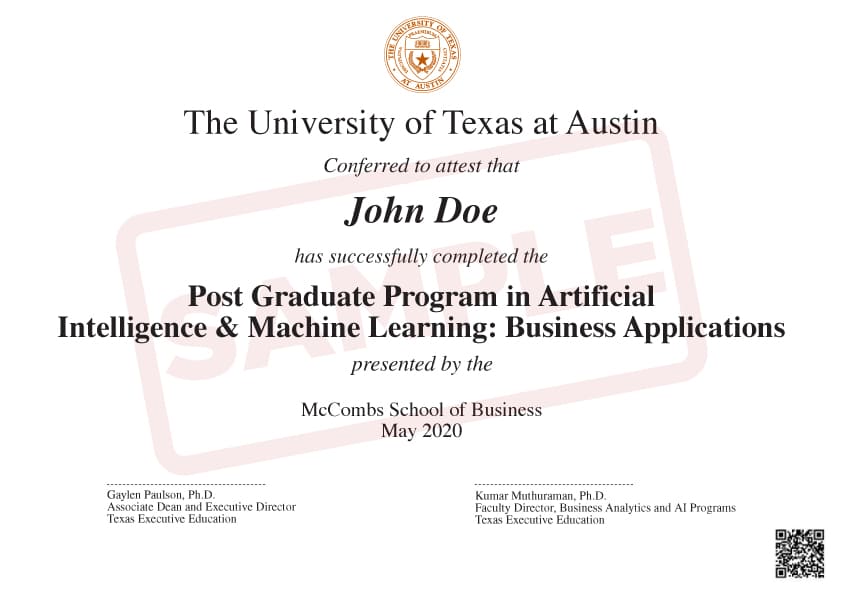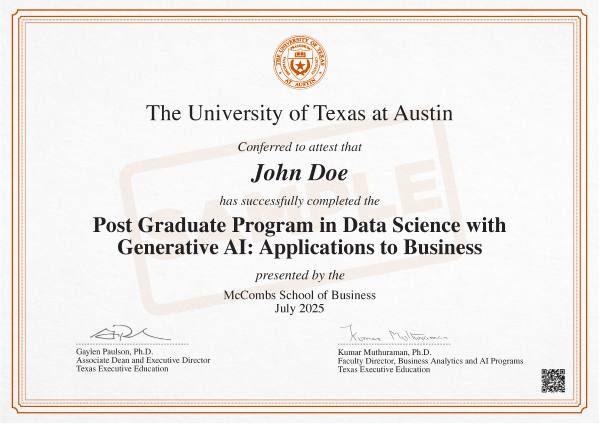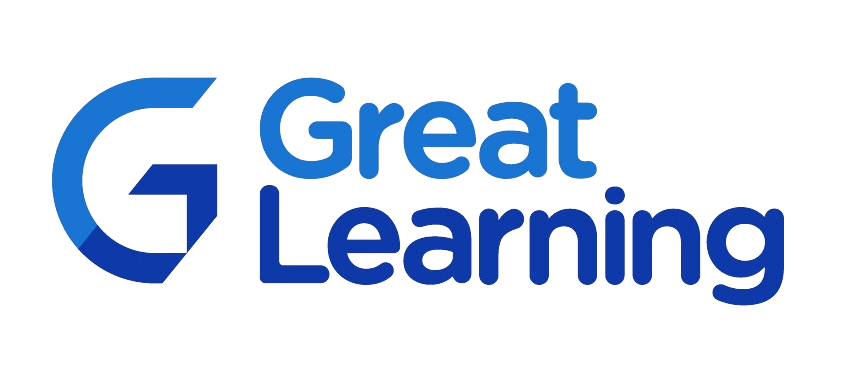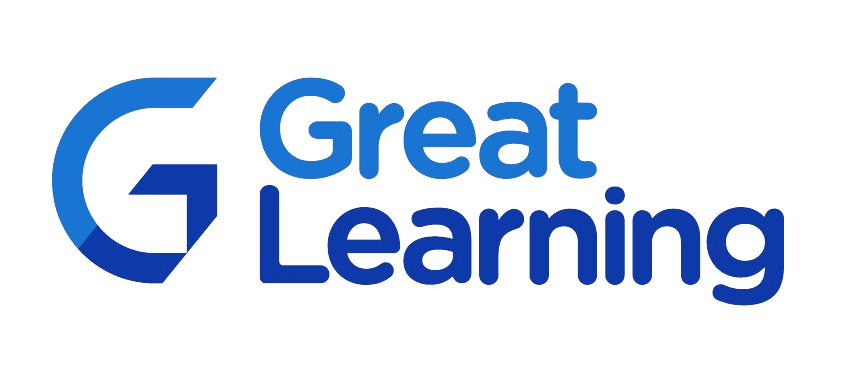Learn more about the course
Get details on syllabus, projects, tools, and more
Help us understand you better
What matters the most to you in an Artificial Intelligence & ML course?

Master Data Science and AI
Earn certificates in Both Data Science and AI
Application closes 26th Feb 2026
What’s new in this online course?
-

Upgraded Course Curriculum
Curriculum updated with new tools and technologies specific to Generative AI applications such as Large Language Models, Prompt Engineering, and AI-driven automation.
-

Future-Ready AI and Deep Learning Skills
Gain cutting-edge Deep Learning expertise from the University of Texas at Austin, covering algorithms like Neural Networks, Computer Vision, and NLP. These in-demand skills prepare you for roles at top tech companies.
Program Outcomes
After completing this program, professionals will be able to
-
Understand the applications and implications of Data Science and AI across industries, and their impact on business strategy, operations, and innovation.
-
Perform end-to-end data analysis and extract strategic insights for a range of business challenges through analytical thinking, data-driven strategies, and GenAI-enhanced workflows.
-
Build an industry-ready portfolio in widely used Data Science tools and technologies, including those specific to Generative AI applications.
-
Master the fundamentals of Artificial Neural Networks to uncover insights and solve complex business challenges
-
Enable machines to understand human sentiment and language, and summarize conversations using NLP techniques.
-
Build models to predict future trends and use them to business strategy
Earn certificates from Texas McCombs
Key highlights
Why choose this course in Data Science and AI?
-

Learn from world’s top university
Earn certificates from a world-renowned university, taught by the esteemed faculty of Texas McCombs
-

Industry-ready curriculum
Learn the foundations of Python, GenAI, and Deep Learning, gain valuable insights, and apply your skills to transition into AI roles
-

Learn at your convenience
Gain access to 600+ hours of content online, including lectures, assignments, and live webinars which you can access anytime, anywhere
-

10 hands-on projects
Get practical hands-on training with a 4-week capstone project, case studies, and over 27 AI tools
-

Get expert mentorship
Interact with mentors who are experts in AI and get guidance to complete and showcase your projects
-

Personalized program support
Get personal assistance from a Program Manager to complete your course with ease.
Skills and tools you will learn
Prompt Engineering
Python Foundations
Business Statistics
Supervised Learning
Ensemble Techniques
Unsupervised Learning
Generative AI
SQL
Neural Networks
Computer Vision
Natural Language Processing
Prompt Engineering
Python Foundations
Business Statistics
Supervised Learning
Ensemble Techniques
Unsupervised Learning
Generative AI
SQL
Neural Networks
Computer Vision
Natural Language Processing
view more
Careers in Data Science and AI
-
11.5 Million
job Openings in Data Science by 2026
-
$103.5 Billion
The projected global business analytics market size by 2027
-
$415.4 Billion
is the projected deep learning market value by 2030
Careers in Data Science and AI
Here are the ideal job roles in AI & Data Science sought after by companies in the US:
-
Machine Learning engineer
-
Data Scientist
-
AI Research Scientist
-
Natural Language Processing (NLP) Engineer
-
Big Data Engineer
-
AI Product Manager
-
Robotics Engineer
-
Business Intelligence Developer
-
Generative AI (GenAI) Developer
-
AI Consultant
Our alumni work at top companies
- Overview
- Career Transitions
- Why GL
- Learning Journey
- Curriculum
- Projects
- Tools
- Certificate
- Faculty
- Mentors
- Reviews
- Career support
- Fees

Who is this ideal for
Professionals aspiring to empower their career with Data Science and AI
-
Young professionals
Early-career professionals looking to build expertise in the most widely-used Data Science and AI tools Technologies
-
Mid-senior professionals
Professionals who want to make data-driven decisions and drive key strategies across business functions
-
Project managers
Mid-career executives looking to advance their careers in the Data Science and AI domain
-
Tech leaders
Professionals who want to apply Data Science and AI skills to solve real-world business problems, drive innovation, and advance to managerial or leadership roles
Experience a unique learning journey
Our pedagogy is designed to ensure career growth and transformation
-
Learn anytime, anywhere
Learn through online videos by world class faculty
-
Weekly online mentorship by experts
Get assistance on 10+ industry relevant projects and reinforce concepts through weekly sessions
-
Network with people of similar interests
Interact with peers to grow your professional network
-
Dedicated program support
Dedicated Program Manager to solve your queries
Ready to take the next step?

-

Explore a sample course from our faculty
-

Know more about the case-studies & projects
-

Experience a sample mentorship session with an industry expert
Application closes in:
1
Days
2
2
Hrs
0
2
Mins
4
0
Secs

-

Get a detailed program overview
-

Understand how this program can help achieve your career goals
-

Get more information about the admission process & next steps
50,000+ learners found this helpful
Comprehensive Curriculum
Elevate your career with our comprehensive data science and artificial intelligence course, tailored to nurture the modern AI professional. The curriculum has been designed by the faculty at the University of Texas at Austin. This sought-after course in artificial intelligence encompasses modules such as Data Science Foundations and Techniques, offering deep Domain Exposure and empowering learners with Visualization and Insights tools.
Pre-Work | 1 week
In this week, learners will build a foundation in core data science and Generative AI concepts, develop Python skills for data manipulation and analysis, and explore practical applications of Generative AI. The week concludes with a hands-on case study applying data science to solve a real-world business problem. ● Introduction to Data Science ● Introduction to Generative AI ● Python Programming Essentials
Module 01: Data-driven Insights using Python | 4 Weeks
In this module, learners will read, explore, manipulate, and visualize data to tell stories, solve business problems, and deliver actionable insights and business recommendations by performing exploratory data analysis using some of the most widely used Python packages.
Week 1: Python Fundamentals for Working with Data
Variables and Data Types Data Structures Conditional and Looping Statements Functions
Week 2: Data Manipulation Using NumPy and Pandas
NumPy Arrays and Functions Accessing and Modifying NumPy Arrays Saving and Loading NumPy Arrays Pandas Series (Creating, Accessing, and Modifying Series) Pandas DataFrames (Creating, Accessing, Modifying, and Combining DataFrames) Pandas Functions Saving and Loading Datasets Using Pandas
Week 3: Exploratory Data Analysis for Extracting Insights
Data Overview Univariate Analysis (Histograms, Boxplots, and Bar Graphs) Bivariate/Multivariate Analysis (Line Plot, Scatterplot, LM Plot, Jointplot, Violin Plot, Strip Plot, Swarm Plot, Cat Plot, Pairplot, Heatmap) Customizing Plots Missing Value Treatment Outlier Detection and Treatment
Week 4 : PROJECT 1
Module 02: Generative AI for Text Analysis | 2 Weeks
In this module, learners will build practical expertise in Generative AI by mastering Prompt Engineering and Large Language Model workflows. The module covers prompt design, text classification, and summarization, and applying LLMs to solve real-world business problems.
Week 1: Introduction to Prompt Engineering
Introduction to Prompts The Need for Prompt Engineering Different Types of Prompts (Conditional, Few-Shot, Chain-of-Thought, Returning Structured Output) Limitations of Prompt Engineering
Week 2: Text Analysis with LLMs
Introduction to Text-to-Label Generation Data Preparation Process Introduction to Text-to-Text Generation Structure of Text Generation Tasks
Module 03: Decision Making with Business Statistics | 5 Weeks
In this module, learners will use Python for statistical analysis to evaluate business estimates with confidence intervals and test assumptions before committing resources. They will analyze data distributions and perform hypothesis testing to support data-driven decisions.
Week 1: Inferential Statistics Foundations
Experiments, Events, and Definition of Probability Introduction to Inferential Statistics Introduction to Probability Distributions (Random Variable, Discrete and Continuous Random Variables, Probability Distributions) Binomial Distribution Normal Distribution
Week 2: Data Sampling and Estimation for Accurate Insights
Sampling Central Limit Theorem Estimation Introduction to Hypothesis Testing Hypothesis Formulation and Performing a Hypothesis Test One-Tailed and Two-Tailed Tests Confidence Intervals and Hypothesis Testing
Week 3: Common Statistical Tests for Informed Decisions
Test for One Mean Test for Equality of Means Chi-Square Test of Independence One-Way ANOVA
Week 4: PROJECT 2
Module 04: Predictive Modeling with Linear Regression | 3 Weeks
In this module, learners will explore linear models to capture relationships between variables and continuous outcomes. They will check the statistical validity of these models and draw inferences to gain business insights into key factors influencing decision-making.
Week 1: Introduction to Modeling Linear Relationships
Introduction to Learning from Data Simple and Multiple Linear Regression Evaluating a Regression Model Pros and Cons of Linear Regression
Week 2: Statistical Inferences from Linear Regression
Statistician vs ML Practitioner Linear Regression Assumptions Statistical Inferences from a Linear Regression Model
Week 3: PROJECT 3
Module 05: Classification Techniques for Predictive Modeling | 3 weeks
In this module, learners will explore classification models to capture relationships between variables and categorical outcomes. They will gain business insights by identifying key factors that influence decision-making.
Week 1: Logistic Regression for Probability-Based Insights
Introduction to Logistic Regression Interpretation from a Logistic Regression Model Changing the Threshold of a Logistic Regression Model Evaluation of a Classification Model Pros and Cons
Week 2: Decision Trees for Transparent Decision-Making
Introduction to Decision Tree
Different Impurity Measures
Splitting Criteria in a Decision Tree
Methods of Pruning a Decision Tree
Regression Trees
Pros and Cons
Week 3: PROJECT 4
Module 06: Robust Data Modeling with Ensembling and Tuning Techniques | 5 weeks
In this module, learners will use ensemble techniques to combine decisions from multiple models and improve predictions. They will apply feature engineering and hyperparameter tuning to build robust models that help optimize business costs.
Week 1: Bagging Ensembles for Improved Predictive Performance
Introduction to Ensemble Techniques Introduction to Bagging Sampling with Replacement Introduction to Random Forest
Week 2: Boosting Ensembles for Improved Predictive Performance
Introduction to Boosting Boosting Algorithms (AdaBoost, Gradient Boost, XGBoost) Stacking
Week 3: Tuning and Validation Techniques for Optimized Model Performance
Feature Engineering Cross-Validation Oversampling and Undersampling Model Tuning and Performance Hyperparameter Tuning Grid Search Random Search Regularization
Week 4: PROJECT 5
Module 07: Pattern Discovery with Unsupervised Learning | 3 Weeks
In this module, learners will apply clustering algorithms to group data based on similarity and uncover hidden patterns. The content also includes dimensionality reduction techniques to enhance understanding of intrinsic data patterns and structure
Week 1: Insightful Data Segmentation with K-Means Clustering
Introduction to Clustering Types of Clustering K-Means Clustering Importance of Scaling Silhouette Score Visual Analysis of Clustering
Week 2: Discovering Patterns with Hierarchical Clustering and PCA
Hierarchical Clustering Cophenetic Correlation Introduction to Dimensionality Reduction Principal Component Analysis
Week 3: PROJECT 6
Module 08: Data Querying and Analytics with SQL | 4 Weeks
In this module, learners will build a foundation in database concepts and SQL. They will write simple queries to filter and retrieve data and use advanced SQL techniques with joins, window functions, and subqueries to solve real-world data problems and extract business insights.
Week 1: Data Retrieval & Aggregation Essentials
Introduction to Databases and SQL Fetching Data, Filtering Data Aggregating Data
Week 2: Querying Techniques for Relational Data Analysis
In-Built Functions (Numeric, Datetime, Strings) Joins Window Functions
Week 3: Advanced Querying for Enhanced Proficiency and Insights
Subqueries Order of Query Execution
Week 4: PROJECT 7
MODULE 9: INTRODUCTION TO NEURAL NETWORKS
This course is designed to provide you with a comprehensive understanding of Deep Learning, specifically Artificial Neural Networks. These networks consist of multiple hierarchical levels and serve as fundamental building blocks for knowledge discovery, application, and prediction from data. Through this course, you will gain expertise in effectively applying Artificial Neural Networks to real-world scenarios
Pre-work for Deep Learning, Artificial Neurons,
Tensorflow, and Keras
Introduction to Artificial Neural Networks
Building Blocks of Artificial Neural Networks
MODULE 10: INTRODUCTION TO COMPUTER VISION
Gain expertise in leveraging Convolutional Neural Networks (CNNs) to empower computer systems with visual perception and comprehension. This program equips you with the skills to effectively process and utilize image data for business applications.
Pre-work for Computer Vision
Introduction to CNN - Working with Images
Transfer Learning
MODULE 11: INTRODUCTION TO NATURAL LANGUAGE PROCESSING
This course will explore the fascinating application of Neural Networks in enabling computers to comprehend human language. Specifically, you will learn how to analyze text data and determine its underlying sentiment.
Pre-work: Natural Language Processing
Vectorization and Sentiment Analysis
Sequential Natural Language Processing using Deep Learning
Work on 10 hands-on projects
Dive into Data Science and AI projects to sharpen skills and build a unique portfolio
-
1000+
Projects completed
-
22+
Domains
Languages and Tools covered
Meet your faculty
Meet our expert faculty-professionals with in-depth Data Science and AI knowledge and a passion to help you succeed
Interact with our mentors
Interact with experienced Data Science and AI experts who will guide you in your AI learning & career journey
Get your dream job with dedicated career support
-
Personalized mentorship from industry experts
Get career mentorship from our industry experts to prepare for jobs in Data Science and AI
-
Interview prep with experts
Participate in mock interviews and access our tips & hacks on the latest interview questions of top companies
-
Resume & profile review
Get your resume/cv and LinkedIn profile reviewed by our experts to highlight your Data Science and AI skills & projects
-
E-portfolio
Build an industry-ready portfolio to showcase your mastery of skills and tools
Course fees
The course fee is USD 5,500
Invest in your career
-

Lead Data Science and AI innovation by mastering core AI & ML concepts & technologies
-

Secure a dream career in Data Science and AI with our dedicated career support
-

Build AI-powered applications using GenAI, NLP, and other tools
-

Earn certificates in Data Science and AI
Third Party Credit Facilitators
Check out different payment options with third party credit facility providers
*Subject to third party credit facility provider approval based on applicable regions & eligibility
Admission Process
Admissions close once the required number of participants enroll. Apply early to secure your spot
-

1. Fill application form
Apply by filling a simple online application form.
-

2. Interview process
A panel from Great Learning will review your application to determine your fit for the program.
-

3. Join program
After a final review, you will receive an offer for a seat in the upcoming cohort of the program.
Batch start date
-
Online · To be announced
Admissions Open



 Speak with our expert
Speak with our expert


































































